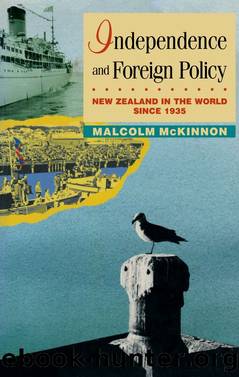Independence and Foreign Policy by Malcolm McKinnon

Author:Malcolm McKinnon [McKinnon, Malcolm]
Language: eng
Format: epub
ISBN: 9781869405366
Publisher: Auckland University Press
Published: 2012-01-01T00:00:00+00:00
Labourâs position on the warâand the discomfort it felt about the issueâwas entirely explicable if we remind ourselves of its perspective on the independent foreign policy consensus of the preceding decade. The belief in economic and social, not military solutions, anti-militarism and hatred for war, support for détente, the Commonwealth and the United Nationsâall can be identified in Labourâs attitude. So also can anti-Communism. Unfortunately for Labour, it was difficult to settle on a policy which accommodated all of these goals or values.
With the pressure from New Zealandâs allies to do something, with the party unwilling to break with the foreign policy consensus in any other respect, it found itself in an unappealing situation. Nordmeyer made a statement on 28 April 1965. He stressed that the issue should be handed over to the United Nations, that it was not for one nation, no matter how powerful, to decide, and that ANZUS did not pledge New Zealand to a war.42 This was definitely leaning to the side of opposition to the war without actually saying so. At the Labour Partyâs annual conference in May the party decided to oppose the sending of New Zealand troops to Vietnam. Nordmeyer called for a negotiated settlement that would end Communist aggression. Any action to resist aggression should be undertaken only through the United Nations or any other international authority. Nordmeyer also told the conference, when speaking in support of the resolution against the deployment, that New Zealandâs integrity among the newly emergent nations depended on not sending troops to Vietnam.
The fact that Nordmeyer was talking in terms of Communist aggression gave an indication of the limits of Labourâs challenge to the government. Not only was Labour, like National, an anti-Communist party, it was either unable or unwilling to define the war as other than a war against Communism. Labourâs anti-Communism and its healthy respect for the publicâs anti-Communism qualified that criticism: the comment above about âonly fanatics, terrorists or communistsâ wanting to fight the West was a classic instance of the demarcation line which even the anti-war movement (as distinct from the Labour Party) drew between Communism and legitimate dissent.
Was Labourâs position convincing thoughâopposition to the war and to New Zealand military involvement, but opposition also to Communism? Nordmeyer did argue that as the Americans had refused to send troops to Malaysia because they were too heavily committed in Vietnam, New Zealand should refuse to help in Vietnam because it was too heavily committed in Malaysia. But it was difficult to make that distinction, as the government itself had found. It served only to underline Labourâs dilemma. The connected set of assumptions had come adrift: on the one hand, the belief in economic and social rather than military solutions, always particularly strong in the Labour Party; on the other, anti-Communism.
Friction within the party was inevitable. A minority, led by Timaru M.P. Basil Arthur, rebelled against the partyâs official policy; America should receive support, he said, for what the government was doing in VietnamâNorth Vietnam was the aggressor.
Download
This site does not store any files on its server. We only index and link to content provided by other sites. Please contact the content providers to delete copyright contents if any and email us, we'll remove relevant links or contents immediately.
The European Opportunity by Felipe Fernández-Armesto(569)
The European History Highway: A Guide to Internet Resources by Dennis A. Trinkle Scott A. Merriman(535)
Morgan Kaufmann Digital Watermarking and Steganography by Ingemar Cox Matthew Miller Jeffrey Bloom Jessica Fridrich Ton(528)
The Seven Wonders of the Ancient World by Michael Denis Higgins(519)
Hyperculture by Byung-Chul Han(508)
European Security in a Global Context by Thierry Tardy(505)
European Security without the Soviet Union by Stuart Croft Phil Williams(502)
The Routledge companion to Christian ethics by D. Stephen Long Rebekah L. Miles(497)
Get Real with Storytime by Julie Dietzel-Glair & Marianne Crandall Follis(443)
Hudud Al-'Alam 'The Regions of the World' - a Persian Geography 372 A.H. (982 AD) by V. V. Minorsky & C. E. Bosworth(436)
Gorbachev And His Generals by William C. Green(428)
Tibetan Studies in Comparative Perspective by Chih-yu Shih Yu-Wen Chen(427)
Governance, Growth and Global Leadership by Espen Moe(417)
How Languages Are Learned 5th Edition by Patsy M Lightbown;Nina Spada; & Nina Spada(406)
CliffsNotes on Fitzgerald's The Great Gatsby by Kate Maurer(399)
The Oxford History of the World by Fernández-Armesto Felipe;(388)
The Egyptian Economy, 1952-2000 by Khalid Ikram(379)
Oral Poetry and Narratives from Central Arabia: The Poetry of Ad-Dindan : A Bedouin Bard in Southern Najd (Studies in Arabic Literature, Vol 17) (English and Arabic Edition) by P. M. Kupershoek P. Marcel Kurpershoek(365)
The Oxford Handbook of the Incas by Sonia Alconini(364)
